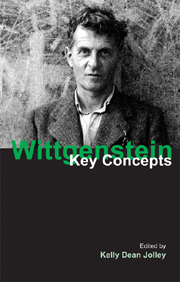Book contents
- Frontmatter
- Contents
- Contributors
- Abbreviations
- Introduction
- 1 Wittgenstein's philosophical remarks
- 2 Wittgenstein on meaning and meaning-blindness
- 3 Language-games and private language
- 4 Wittgenstein on family resemblance
- 5 Ordinary/everyday language
- 6 Wittgenstein on rule-following
- 7 Thinking and understanding
- 8 Psychologism and Philosophical Investigations
- 9 Moore's paradox revisited
- 10 Aspect perception
- 11 Knowing that the standard metre is one metre long
- 12 Therapy
- 13 Criteria
- 14 Grammatical investigations
- 15 Teaching and learning
- 16 Expression and avowal
- Chronology of Wittgenstein's life
- Bibliography
- Index
Introduction
- Frontmatter
- Contents
- Contributors
- Abbreviations
- Introduction
- 1 Wittgenstein's philosophical remarks
- 2 Wittgenstein on meaning and meaning-blindness
- 3 Language-games and private language
- 4 Wittgenstein on family resemblance
- 5 Ordinary/everyday language
- 6 Wittgenstein on rule-following
- 7 Thinking and understanding
- 8 Psychologism and Philosophical Investigations
- 9 Moore's paradox revisited
- 10 Aspect perception
- 11 Knowing that the standard metre is one metre long
- 12 Therapy
- 13 Criteria
- 14 Grammatical investigations
- 15 Teaching and learning
- 16 Expression and avowal
- Chronology of Wittgenstein's life
- Bibliography
- Index
Summary
Biographical sketch
Ludwig Wittgenstein was born in 1889 to a wealthy and cultured Viennese family. He decided to study aeronautical engineering, and so went to Manchester University (England) in 1908. There, he became deeply interested in the philosophy of mathematics, and eventually in the works of Gottlob Frege. He met Frege, who advised him to go to Cambridge to study with Bertrand Russell. He did so in 1911. Wittgenstein studied in Cambridge from 1911 to 1913. When the First World War began, he joined the Austrian army, fought, and was taken captive in 1917. The war ended while he was interned. During the war years he drafted the Tractatus Logico-Philosophicus, and after the war the book was published in German and translated into English.
Around 1920, believing that he had in the Tractatus solved the problems of philosophy, he tried a variety of jobs – gardener, teacher and architect. Finally, in 1929, he found himself again entangled in philosophical problems and he returned to Cambridge to work as a philosopher. Wittgenstein was dissatisfied in various ways with the Tractatus; the problems he had treated in it he was again puzzling over. For several years in Cambridge he worked feverishly to find new and better ways of thinking through those problems. He conducted famous and darkling seminars in which he worked out many of the ideas that would compose the Philosophical Investigations. He worked on that book for roughly twenty years, drafting and redrafting the remarks in it, as well as organizing and reorganizing them.
- Type
- Chapter
- Information
- WittgensteinKey Concepts, pp. 1 - 14Publisher: Acumen PublishingPrint publication year: 2010



